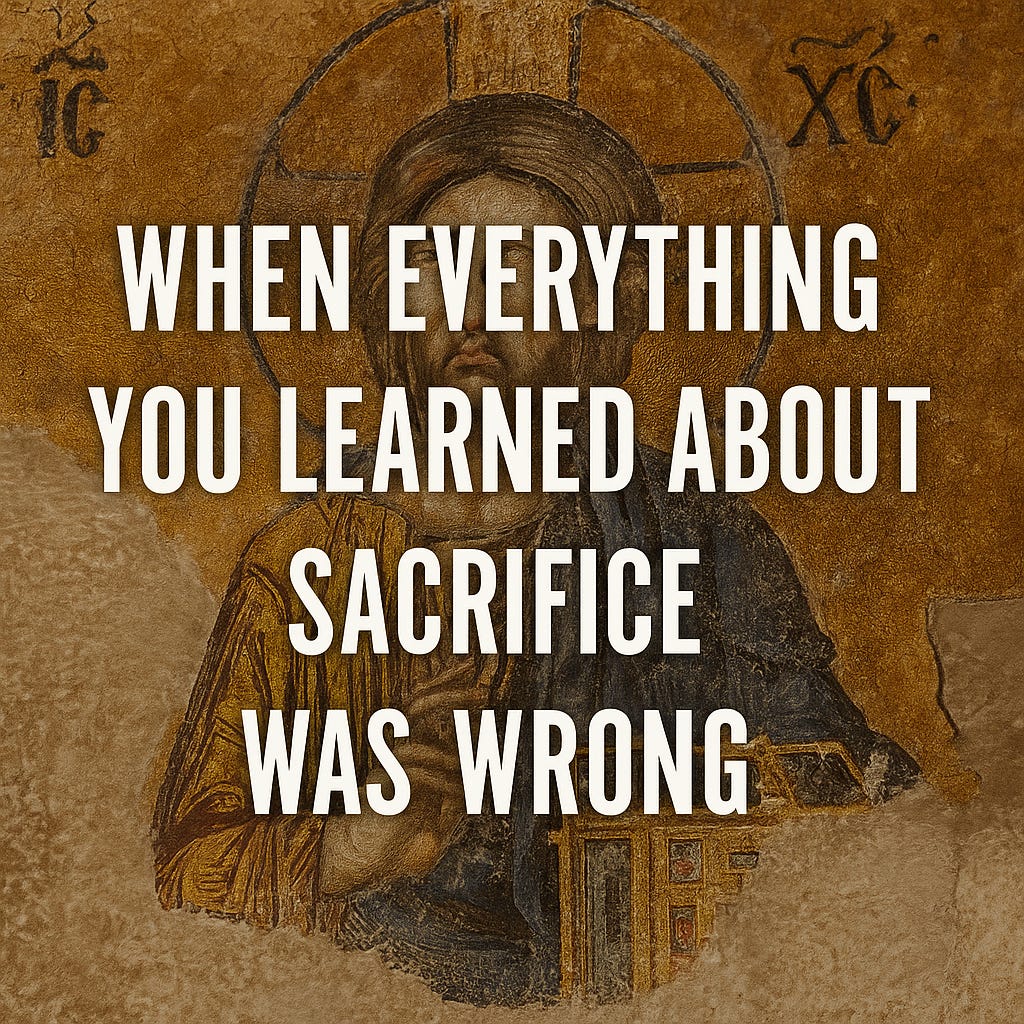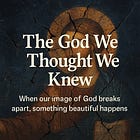When Everything You Learned About Sacrifice Was Wrong
Untangling the knots that have bound us for too long
When Everything You Learned About Sacrifice Was Wrong
Untangling the knots that have bound us for too long
TL;DR: For years, I believed sacrifice was about punishment—Jesus taking the hit so God could forgive me. But digging deeper into scripture, I’m discovering sacrifice was never about payment. It was about purification, cleansing, and restoration. On the cross, Jesus wasn’t satisfying God’s wrath; he was revealing God’s love—absorbing the world’s contamination and transforming it. The cross is less a transaction and more an invitation: not substitution, but participation.
Note: I'm working through Lamb of the Free by Andrew Rillera in a series of posts—not as reviews, but as reflections in this wounded healer's journal. This book is challenging everything I thought I knew about sacrifice, atonement, and God's heart, and I'm processing it here in real time. If you're questioning inherited narratives about a violent God or curious what the Hebrew scriptures actually say about sacrifice, consider walking this path with me.
Other Posts In This Series
This Doesn’t Sound Like Jesus
There came a moment when the story I had been handed about the cross just stopped working.
I had preached it.
I had defended it.
I had used it to comfort the grieving and warn the wandering.
But when I sat with real suffering,
When I faced my own questions in the middle of chemotherapy,
Something inside me whispered: This doesn’t sound like Jesus.
And that terrified me.
Because if the cross wasn’t about God’s wrath being satisfied, then what was it about?
The Story We Were Told
For most of my life, I believed a very specific story about Jesus:
God is angry.
Sin creates a debt.
Someone has to pay.
Jesus steps in as our substitute.
He takes the punishment we deserve.
God’s wrath is satisfied.
We’re forgiven.
It was clean.
Mathematical.
Fair.
But it might not be what the Bible actually says.
When Scholars Start Digging
I’ve been reading Andrew Rillera’s Lamb of the Free, where he spends years diving deep into the Hebrew scriptures, tracing every reference to sacrifice, examining every use of the word “atonement,” and looking at what these ancient texts actually meant in their own world.
What he finds is stunning:
Sacrifice wasn’t about punishment.
It wasn’t about God needing a blood payment.
It wasn’t about substitution.
It was about purification.
It was about cleansing.
It was about restoration.
When something holy was contaminated,
You didn’t punish it.
You cleansed it.
You purified it.
You made it whole again.
The Translation Problem
Here’s where our English Bibles tripped us up.
The Hebrew word for “atonement” is kipper.
And kipper doesn’t mean “payment for sin.”
It means “to remove contamination.”
It means “to purify.”
It means “to cleanse.”
And here’s the kicker:
When kipper happens in the Old Testament,
The thing being purified isn’t usually the sinner.
It’s the holy objects:
The altar,
The sanctuary,
The sacred space.
Not people.
Sacred space.
What This Changes
If sacrifice wasn’t about punishment…
If atonement wasn’t about payment…
If the cross wasn’t about God’s need for blood…
Then what was it about?
What if it was about God saying:
“I’m not backing away from your mess. I’m moving toward it. I’m not demanding payment. I’m absorbing the contamination. I’m not punishing you. I’m purifying everything.”
The Jesus Pattern
Look at how Jesus lived:
He didn’t avoid the unclean, he touched them.
He didn’t demand payment from sinners, he ate with them.
He didn’t punish the broken, he healed them.
He didn’t keep his distance from contamination, he absorbed it.
On the cross,
Jesus wasn’t being punished by God.
Jesus was revealing God’s heart:
Willing to absorb all the violence,
All the contamination,
All the brokenness,
And transform it.
Why This Matters
Because when we get sacrifice wrong, we get justice wrong.
If we think God’s justice is about punishment, then our justice will be too.
We build prisons instead of hospitals.
We seek revenge instead of restoration.
We demand payment instead of offering healing.
But what if God’s justice looks more like a doctor than a judge?
What if it’s about making things whole, not making someone pay?
The Invitation to Die
Here’s the wild part of the New Testament:
Jesus didn’t die so we don’t have to.
Jesus died so we could die with him.
Not substitution.
Participation.
Paul never says Christ died instead of us. He says, “We were buried with him… so that, just as Christ was raised from the dead… we too might walk in newness of life” (Romans 6:4).
“I have been crucified with Christ, and I no longer live, but Christ lives in me” (Galatians 2:20).
Not replacement.
Union.
Transformation.
“Take up your cross.”
“Die to yourself.”
“Be crucified with me.”
It’s not a transaction for forgiveness.
It’s an invitation into transformation.
For Those Wrestling With This
If this is rattling your theology, you’re not alone.
Sometimes our understanding of God has to die before we can meet the real God. Sometimes our systems have to fall apart before we can see the beauty of what Jesus actually did.
You’re not losing your faith.
You’re losing the parts of your faith that were built on misunderstanding.
And that’s sacred work.
The Better Story
What if the story isn’t:
“God was angry, Jesus took the hit, now we’re forgiven”?
What if the story is:
“God was never angry,
contamination was the problem,
Jesus absorbed it all,
now everything can be made clean”?
N.T. Wright critiques the picture of an “angry despot” deity who must be appeased, calling it deeply damaging and unbiblical.
What if the cross reveals not God’s need for punishment but God’s relentless commitment to restoration?
Moving Forward
I don’t know where you are in this journey.
Maybe you’re clinging to the old understanding.
Maybe you’re curious.
Maybe you’ve already let it go.
Here’s what I’m learning:
The God revealed in Jesus is better than I thought.
More loving.
More committed to healing.
More present in our pain.
And that God doesn’t need Jesus to die to love you.
That God loves you so much that Jesus was willing to die to show you.
There’s a difference.
And it changes everything.
The Sacred Practice of Reflecting
What story about God, Jesus, or the cross did you grow up with, and how has it shaped your image of God?
When you hear that sacrifice was about purification and restoration, not punishment, how does that shift your understanding of God’s justice?
In what ways have you seen the “punishment view of God” shape how we deal with justice in our world (prisons, revenge, exclusion)?
What would it look like in your life or community to practice “restorative” justice that looks more like a doctor than a judge?
Where do you sense God inviting you to move from fear of punishment toward trust in love?





God *does* feel angry. I am glad about that. Anger signals where there is perceived injustice or boundary violation. Anger says "It shouldnt be this way!" and energises us to take corrective action. Yes, He is angry, for His righteousness' sake. And yet, He is not controlled by His anger, which is fair. (Doesnt Gaza make you angry? The arrogance of the powerful? The damage hate filled hearts are and do?) Yet He is love. Love is antiseptic even as it draws us in. "Our God is a consuming fire." He does absorb and transform; from death to life or to dust and ashes. And even so, all praises to the One who formed us and brought us to life, from dust in the first place! He is GOOD!
I am with you in this understanding of sacrifice and atonement.Very enlightening.